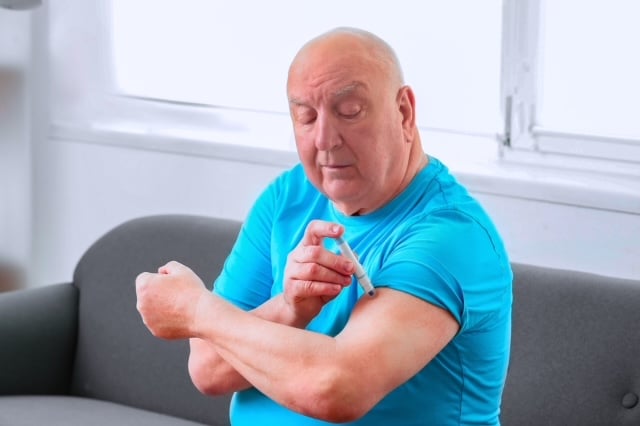High cholesterol effects 38% of American adults and proves to be a key trigger for the onset of cardiovascular disease such as coronary heart disease, stroke, and peripheral vascular disease. High cholesterol also increases the risk of diabetes and high blood pressure. The underlying cause is that high cholesterol leads to plaque buildup inside your blood vessels limiting blood flow.
A proper nutritious diet and regular exercise can help in managing cholesterol. However, your physician might also prescribe medication to reduce your cholesterol level. Among cholesterol-lowering medications, physicians often opt for statins.
As stated by the Centers for Disease Control and Prevention (CDC), statins can effectively reduce LDL cholesterol (bad cholesterol) by slowing down cholesterol production from the liver. Furthermore, they can improve the ability of the liver to eliminate LDL cholesterol from the blood.
Hence, statins are recommended as the first-line drugs to prevent the onset of heart attack or stroke. The CDC statistics reported that nearly 93% of adults using cholesterol-lowering medications used a statin. However, not everyone is the right candidate for statin therapy.
Side effects such as liver problems or muscle pain can cause difficulty to take statins. Fortunately, there are other medications to reduce bad cholesterol and increase good cholesterol (HDL cholesterol) that your physician may prescribe.
PCSK9 inhibitor, a new class of injectable drugs, is an antibody that targets PCSK9 protein and inhibits its ability to work. They can significantly improve the liver’s ability to eliminate stubborn LDL cholesterol from the blood by reducing overall LDL cholesterol levels. Thus, these cholesterol-lowering injectable drugs can reduce the risk of stroke or heart attack.
As published in the Physicians’ Academy for Cardiovascular Education news, PCSK9 inhibitors could help reduce LDL cholesterol by as much as 75 percent when used in combination with statins.
Recently, the US Food and Drug Administration (FDA) approved Repatha (evolocumab) and Praluent (alirocumab) injections under PCSK9 inhibitors. They can be used alone or in conjunction with lifestyle changes and other cholesterol-lowering medications.
Both Praluent and Repatha are given as subcutaneous injections (delivered just under the skin). However, Praluent and Repatha come in different strengths and formulations. In addition, Praluent is not FDA approved for use in patients under 18 years old. Repatha, however, is FDA approved to treat children aged 10 years and older.
Both treatments are effective medications to help lower LDL cholesterol and decrease the risk of heart attack, stroke, or chest pain. They are similarly effective when used in combination with statin medications or other cholesterol-lowering drugs. One drug may be preferred over the other depending on different factors, such as price, potential side effects, and allergies.
PCSK9 inhibitors are a safe and effective adjunct to lifestyle changes and statin treatment in patients who are in need of a drastic reduction in LDL-C levels.
You can consult with one of our experienced cardiologists through a virtual visit or in person at one of our 10 clinic locations conveniently located throughout the valley and Northern Arizona. To schedule an appointment, call Peak Heart & Vascular at 602-698-PEAK or submit an online request form.
https://cdc.gov/cholesterol/treating_cholesterol.htm
A proper nutritious diet and regular exercise can help in managing cholesterol. However, your physician might also prescribe medication to reduce your cholesterol level. Among cholesterol-lowering medications, physicians often opt for statins.
As stated by the Centers for Disease Control and Prevention (CDC), statins can effectively reduce LDL cholesterol (bad cholesterol) by slowing down cholesterol production from the liver. Furthermore, they can improve the ability of the liver to eliminate LDL cholesterol from the blood.
Hence, statins are recommended as the first-line drugs to prevent the onset of heart attack or stroke. The CDC statistics reported that nearly 93% of adults using cholesterol-lowering medications used a statin. However, not everyone is the right candidate for statin therapy.
Side effects such as liver problems or muscle pain can cause difficulty to take statins. Fortunately, there are other medications to reduce bad cholesterol and increase good cholesterol (HDL cholesterol) that your physician may prescribe.
Injectable Alternative to Statins
PCSK9 inhibitor, a new class of injectable drugs, is an antibody that targets PCSK9 protein and inhibits its ability to work. They can significantly improve the liver’s ability to eliminate stubborn LDL cholesterol from the blood by reducing overall LDL cholesterol levels. Thus, these cholesterol-lowering injectable drugs can reduce the risk of stroke or heart attack.
As published in the Physicians’ Academy for Cardiovascular Education news, PCSK9 inhibitors could help reduce LDL cholesterol by as much as 75 percent when used in combination with statins.
Who are the best candidates for PCSK9 inhibitors treatment?
- Patients who have the most difficult-to-treat LDL cholesterol levels who are at high risk for cardiovascular disease.
- Patients with familial hypercholesterolemia(a genetic disorder that increases the level of cholesterol at an early age).
- Patients with atherosclerosis (an arterial disease caused by the fatty deposit on the inner walls).
- Patients who are intolerant to statins.
Newest Inhibitor Treatments
Recently, the US Food and Drug Administration (FDA) approved Repatha (evolocumab) and Praluent (alirocumab) injections under PCSK9 inhibitors. They can be used alone or in conjunction with lifestyle changes and other cholesterol-lowering medications.
Both Praluent and Repatha are given as subcutaneous injections (delivered just under the skin). However, Praluent and Repatha come in different strengths and formulations. In addition, Praluent is not FDA approved for use in patients under 18 years old. Repatha, however, is FDA approved to treat children aged 10 years and older.
Both treatments are effective medications to help lower LDL cholesterol and decrease the risk of heart attack, stroke, or chest pain. They are similarly effective when used in combination with statin medications or other cholesterol-lowering drugs. One drug may be preferred over the other depending on different factors, such as price, potential side effects, and allergies.
The most common minor side effects of these treatments include:
- Back or muscle pain
- Cold or flu-like symptoms
- Pain at the injection spot
- Redness, swelling or bruising
PCSK9 inhibitors are a safe and effective adjunct to lifestyle changes and statin treatment in patients who are in need of a drastic reduction in LDL-C levels.
Contact Us
You can consult with one of our experienced cardiologists through a virtual visit or in person at one of our 10 clinic locations conveniently located throughout the valley and Northern Arizona. To schedule an appointment, call Peak Heart & Vascular at 602-698-PEAK or submit an online request form.
Reference
https://cdc.gov/cholesterol/treating_cholesterol.htm



